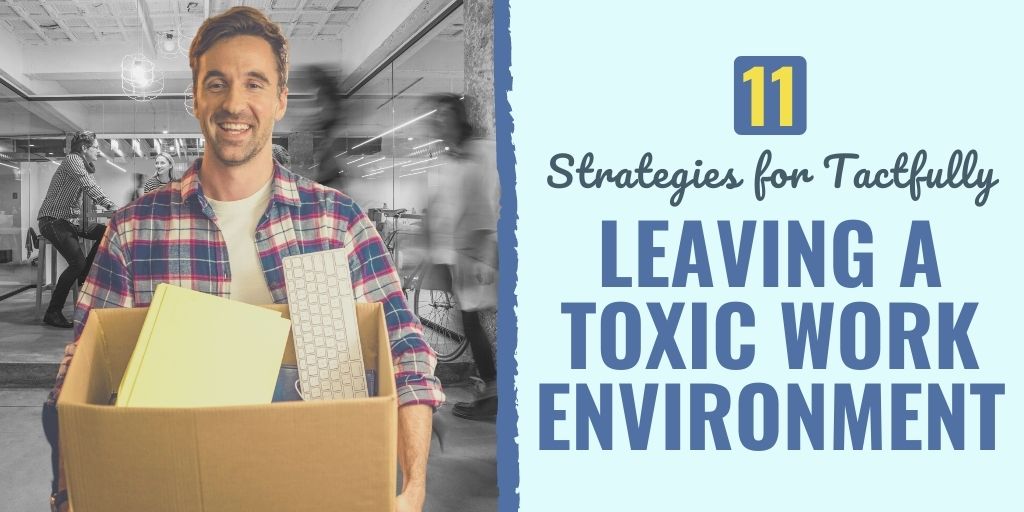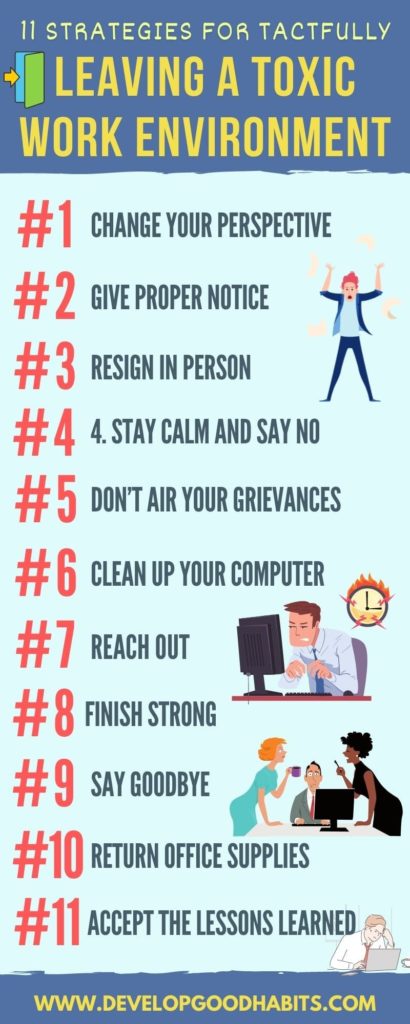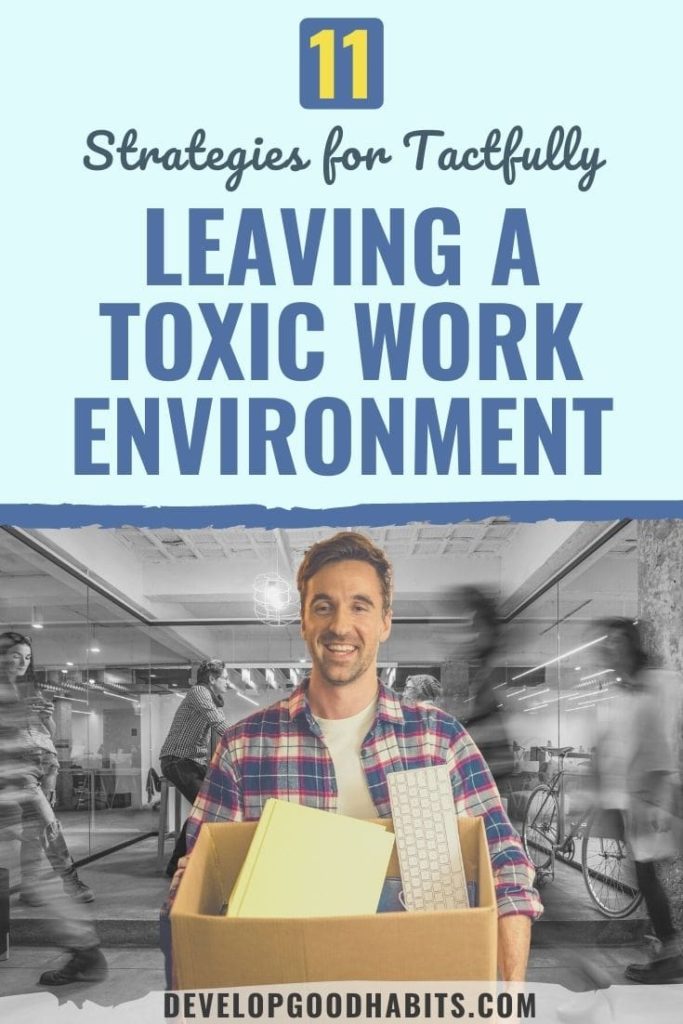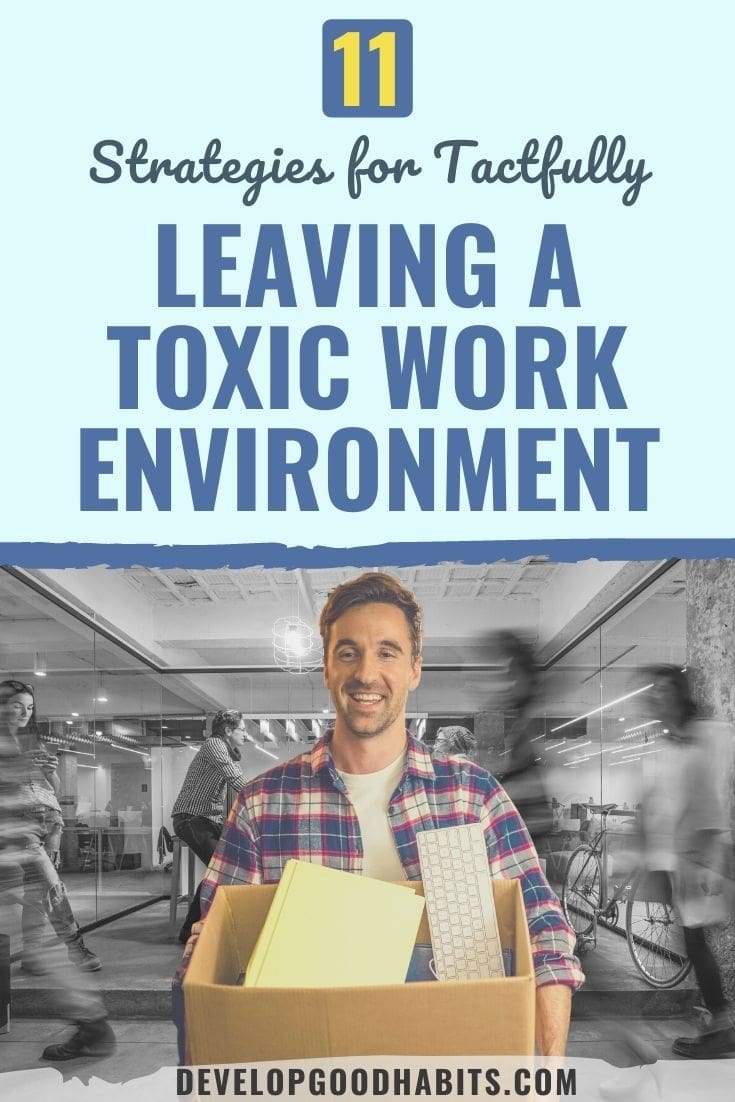
There might be affiliate links on this page, which means we get a small commission of anything you buy. As an Amazon Associate we earn from qualifying purchases. Please do your own research before making any online purchase.
Employed Americans are stressed out.
In fact, studies have consistently shown that being stressed out at work is to be expected, as only a small percentage of responders report experiencing little or no stress on the job.
But sometimes, it goes beyond just being rushed to meet a deadline or feeling overwhelmed with emails. If your work, your coworkers, or the environment of your job cause disruptions in your personal life, your work environment may be toxic. These negative situations can impact your mental and physical health as well as your relationships with friends and family. Because toxic environments can impair your life beyond the workplace, leaving these situations as soon as you can is a healthy decision to make.
But what is a toxic work environment, and how do you know that you’re in one? You certainly don’t want to run away from any job that is stressful, because chances are…your next job will involve some stress as well. So let’s look at what a toxic work environment is and then we will go over 11 strategies you can use to tactfully leave your job if you can identify with any of the scenarios below.
Let’s get started.
What Is a Toxic Work Environment?
We all have our bad days, difficult weeks, and even challenging months at work. Careers tend to be of a cyclical nature, meaning there are ups and downs, but hopefully you have enough “ups” in your job to balance out the more taxing times.
But when your working life is filled with one “down” week after another, it’s an indication that you’re working in a toxic environment. Constantly facing repeated challenges without having a break is certainly a red flag.
Some common challenges that people face when working in a toxic work environment include:
The good news is, if you’re experiencing any of these undesirable situations and you’re considering making a professional change, you’re in good company. In fact, one study conducted by Microsoft found that over 40% of employed Americans are thinking about leaving their job–many of which are doing so to find a position that falls more in line with their personal values.
And it’s true, transitions can be intimidating–and most people try to tread lightly in the professional arena due to the importance of maintaining a strong network and the delicate nature of one’s reputation. But you deserve to work in a healthy work environment that is intrinsically motivating. And when you do land the job of your dreams, you’ll have a greater chance of experiencing career growth and fulfillment.
In this article, we are going to assume that you’ve already made an unsuccessful attempt to address your concerns at work by either talking to someone in human resources or a caring manager who could possibly help you solve any issue you’re facing. After finding no potential remedy, you’ve definitely decided to move on.
So how do you tactfully leave a toxic work environment so you can move on to a more gratifying career without burning any bridges? Let’s take a look at 11 strategies you can employ to stay professional as you make this positive transition for yourself.
11 Strategies for Tactfully Leaving a Toxic Work Environment
1. Change Your Perspective
If your job is toxic, you probably spend a lot of time daydreaming about standing up for yourself and quitting on the spot. But realistically, that would most likely send you into a frantic job search without the possibility of getting a reference from your employer. So instead of focusing your energy on hating and quitting your job, shift those thoughts to accepting that it’s time to create an exit strategy that will allow you to move onto a new job that’s better suited for you. Make a choice to move forward rather than just moving on.
Why does this make a difference? Once you acknowledge and accept that enough is enough with your current job, you can spend less energy on feeling overwhelmed or frustrated when you have problems at work, and instead, focus your energy on preparing to find a job that you will love. This will help you feel optimistic instead of defeated about your upcoming transition.
2. Give Proper Notice
The rule of thumb is to give your employer two weeks’ notice before the last day that you intend to work, but in some industries, 30 days is more standard. As long as you’re not facing threats or harassment in some way, make sure to give your employer time to prepare for your absence and figure out who will cover your duties until they can hire a replacement.

Also, leaving a job without giving sufficient notice may lead to negative consequences that you might not stop to think about in the heat of the moment. For example, you won’t be able to use the employer for a reference in the future, you will probably not be eligible for unemployment during any transitional period, and if you had a severance package waiting for you in the case that you resigned, it likely wouldn’t still be paid out to you.
All this to say, no matter how hard a day or a moment might be, don’t quit on the spot.
3. Resign In Person
It may be tempting to send your boss your notice through email and then duck your head behind your computer for the rest of the day, but the polite and professional thing to do is to schedule a meeting to talk face to face.
To ensure your conversation is positive, you can keep it brief and avoid getting into exactly why you’re quitting. Stay civil and use a calm tone when announcing your planned departure. Offer thanks for the opportunity to work at the company, and maybe even acknowledge some job skills you’ve been able to learn during your tenure. During your meeting, you can also express your willingness to facilitate a smooth transition by helping train a new employee.
After this meeting, make sure to give your employer a formal hard copy of your resignation that indicates the date you plan to leave the company. Write a positive, fact-based letter–again, without going into the reasons behind why you’re quitting.
4. Stay Calm and Say No
Your boss may be caught off guard and panic at the idea of trying to fill your position. But stick to your guns when you’re saying no. You can do this while staying calm, polite, and keeping your composure. Remember, you never know when you might need a recommendation letter or professional reference. If you’ve stayed civil up to this point, now is not the time to ruin that.
5. Don’t Air Your Grievances
After you’ve let your boss know that you’re moving on, don’t feel free to run around burning bridges by speaking poorly about the company to the employees who still work there. Sure, you probably have your group of work buddies that you were able to commiserate with since being a staff member. But don’t run and brag to them that you! are! free! and carry on with how happy you are to never have to see John in accounting ever again.
If there is any time that would be appropriate to address the toxicity in your workplace, it would be during your exit interview. If you are given this opportunity, you can offer some insight on what you experienced while being employed with the company. But if you’re going to do this, make sure to have documentation of the toxic behavior you endured so you can be objective about it and stick to the facts. And, only do this if you feel it could benefit the company in some way or facilitate a change that could potentially help alleviate the stress of the friendly coworkers you’re leaving behind. Don’t just do it so you can say your piece. It has to be a constructive conversation.
6. Clean Up Your Computer
Because you have spent so many hours on it, you may have used your work computer to handle personal matters, or you may have stored some personal files or documents in order to be able to gain easy access during working hours. I know I have some medical receipts saved on my desktop and I have my daughter’s school picture as my background.
Before leaving, save these files onto a USB (or onto the cloud) so you can delete the original file off of your work computer. Also, delete any work-related personal files that won’t benefit the person who inherits your computer. We all have our own personal systems at work that help us stay organized and productive, and I’m confident that if someone were to get on my computer, they would be lost if they opened my primary Excel sheet. So, while it’s work-related, if it isn’t helpful, just get rid of it so the computer is as clean as possible.
You’ll also want to clear out your email. Answer any emails that you can, and remember that sometimes critical information is stored in emails, like passwords or project details. Before your last day, be sure that any individuals who need this information have access to it.
7. Reach Out
If you have made any professional contacts with whom you want to stay in touch, let them know about your upcoming move so you don’t leave them hanging. Give them some warning and offer the contact information for the person who will be taking your place. You may even want to send a thank you card to any clients with whom you created a string connection.
Making the transition easy for your external colleagues will be very much appreciated, and if you move on to a similar position, they may even want to follow you to your new business.

8. Finish Strong
After giving your notice at your current job, short-timers syndrome may begin to set in—especially with the end in sight after such a tough road. But while it may be tempting to slack off, it’s important to take the high road by staying professional and continuing to put all of your effort into doing your job until your last day.
Do this by making sure you’re not leaving anyone hanging when someone takes over your position with an unfinished project or an unresolved issue. Tie up all of your loose ends by either completing or creating a smooth transition for your existing projects. Make sure you leave your workload organized in a way that will allow your successor to easily take over and hit the ground running.
9. Say Goodbye
This can be really hard, especially if there are certain coworkers with whom you could never get along. But you want to ensure that you leave on a positive note. If you plan to stay in the same industry, there is a good chance you will run into some of these colleagues again, and you don’t want there to be any bad blood that could affect your career down the line.
10. Return Office Supplies
Don’t steal the stapler, don’t make them try to hunt you down the following week to get your office key, and don’t leave stuff all over your desk. Return your items to the storage closet (or wherever they belong) and hand over any badges or keys that give you access to the building.
11. Accept the Lessons Learned
You don’t want to jump from one dysfunctional workplace to another, so it’s important to remember the lessons you can derive from your toxic work environment so you can be sure of what you’re looking for (and not looking for) in the future.
To avoid duplicating your experience, ask specific questions in your future interviews that address the issues you’re facing at your current job. This may involve asking about the personality traits that help someone flourish in the organization to see if you might be a good fit, or asking if the company’s atmosphere promotes competition or cooperation. And maybe go one step further by talking to a current or former employee about their experience.
One lesson you may take from a toxic job is your perception of your professional value and your sense of worth should not always be tied to your work performance. When you work in a consistently chaotic environment, your performance is bound to suffer, which may make people around you devalue your input. Don’t let this cloud your judgment of your abilities. Despite your efforts, a toxic work environment will ultimately negatively impact your performance, no matter what.
Final Thoughts on Tactfully Leaving a Toxic Work Environment
If you are working in a toxic work environment, you may feel trapped and like you just can’t escape. However, if you follow the tips laid out in this article, you can move on and move up in the world with grace and dignity.
When you walk out of the door on your last day, you want to be able to do so with your head held high and without any evidence of bad blood between you and your employer.
Remember, your professional life is ultimately your responsibility to manage and you are your greatest advocate. Finding a healthy work environment is possible, but you need to start with taking these steps.

Connie Mathers is a professional editor and freelance writer. She holds a Bachelor’s Degree in Marketing and a Master’s Degree in Social Work. When she is not writing, Connie is either spending time with her daughter and two dogs, running, or working at her full-time job as a social worker in Richmond, VA.








